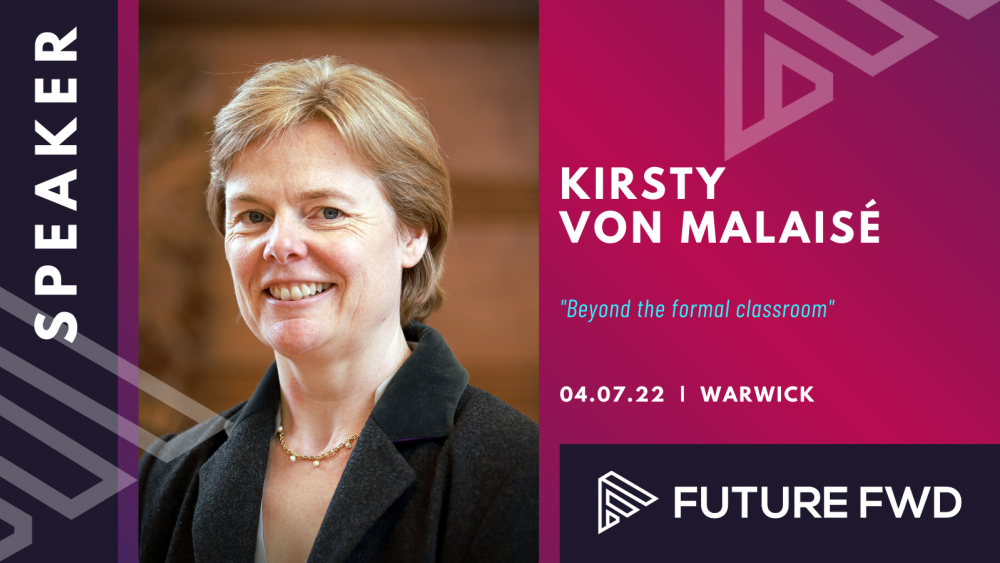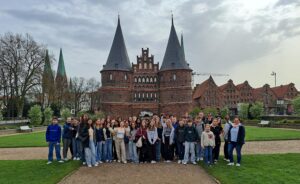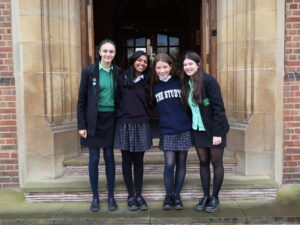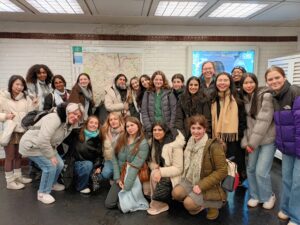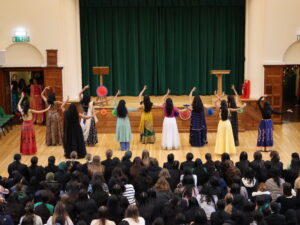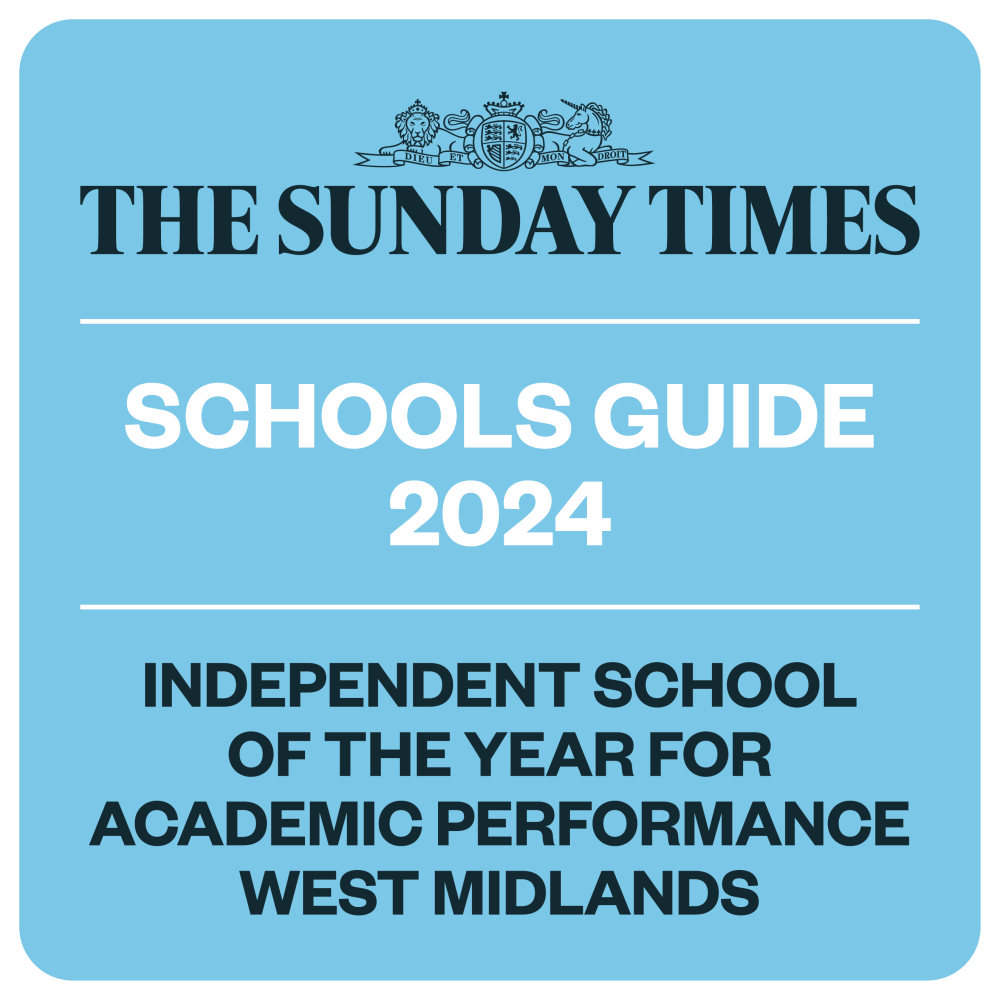On 4th July 2022, KEHS Principal Kirsty von Malaisé addressed the Future Fwd conference in Warwick, a gathering of leading innovators in education, business, tech, the arts and enterprise, to explore how education should prepare the Next Gen for their future. She shared what headteachers view as crucial in developing future-focused student experience, setting out the value of learning experiences that go beyond the curriculum. This is an overview of what she presented to delegates.
Gone are the days when an exemplary academic record is enough to propel you to great prospects. It’s an interesting development that 1 in 6 employers these days – and that number is growing – is qualifications blind. With perceived grade inflation at A Level and at university, what is going to position our students well for making a significant contribution in the future is not only providing, but also finding a way of valuing, other learning experiences.
Girls’ School Association (GSA) schools, like KEHS, recognise that qualifications are important: our students take them seriously and want to be able to demonstrate their knowledge in a rigorous set of assessments. The CAGs process of 2020, which robbed them of this opportunity, highlighted this for us. But we recognise that exams don’t measure everything that students learn and make progress with, and that they could even be a poor indicator of future success in a changing world.
It’s within this context that we find the value of programmes that develop and give significance to other skills – collaboration, communication, creativity and critical thinking – through interdisciplinary and real-world learning. This goes beyond “things we think school leavers should know about” – many independent schools find space for some interesting additional courses here, in leadership, PPE, sustainability, international relations, for example.
In exploring some of the programmes already being delivered in GSA schools and their local communities, four themes, which are sometimes interwoven in one programme, have emerged. Taking breadth of curriculum as a given, broadly these themes are:
– Character education
– Follow-through from primary – the importance of a joined-up approach right from the beginning
– Interdisciplinary learning – making connections between subjects
– Being community focused – making sure our programmes have an impact beyond simply our students, and enabling them themselves to have a wider impact.
Exploring such programmes gives a snapshot of the current thinking of leading educational innovators, revealing what is shaping their curricula and what they believe to be important.
One such example is the Pre Senior Baccalaureate (PSB) offered at Sheffield Girls’, which is one of the most interesting and joined-up curriculum for character development that I have come across. Liz Rodgers, Assistant Head (Co-curricular) at Sheffield Girls’ is a passionate communicator about PSB, which brings together a vibrant, engaging and relevant academic curriculum with character education, co-curricular involvement, community activities, and roles of responsibility and leadership. PSB follows on seamlessly from the Fusion Curriculum of the Infant and Junior School, which also provides learning opportunities that build and enable the development of transferable life skills and through which girls work towards wonderfully titled “Girls of Steel” badges.
My next two examples explore the value of interdisciplinary learning, which is a theme in many GSA schools. In the real world, an ever-changing society faces complex global challenges. Big issues such as climate change, the COVID-19 pandemic and the war in Ukraine are impacting our daily lives and influencing the attitudes of our students. These problems are best understood and tackled through the knowledge and understanding of multiple disciplines, and how they interconnect, rather than in subject silos. This approach to learning mirrors and prepares students for the way that teams work on projects in the workplace.
KEHS chemistry teacher Dr Matthew Simpson is currently engaged in a project which is undertaking research into interdisciplinary learning and its potential role in science curricula. In January, we trialled some interdisciplinary lessons – a biochemistry parasitical task running across two lessons with Year 8, and a discussion and homework activity on environmental sustainability with Year 10. In March, Dr Simpson published an article in Education in Chemistry sharing his opinion about interdisciplinary learning and collaborative teaching with the science teaching community. This Spring, we began a formal collaboration with Dr Donna Dawkins at the School of Education at the University of Birmingham – undertaking research into interdisciplinary learning and the science curricula. We are also hoping to pilot a project with the London Interdisciplinary School.
Dr Simpson and Dr Dawkins are currently investigating in depth the likely outcomes of any future changes to the science curricula. The outcomes so far point towards the use of a “Big Ideas” concept with core principles that can be delivered through interdisciplinary learning:
– Ethical, social and political attitudes
– Collaborative learning
– Engagement
– Participation
– Links to everyday life.
The aim of the next academic year is to trial more lessons in schools across the King Edward VI Foundation as part of researching the relevance and impact of interdisciplinary learning as a teaching method for future science curricula. It’s an exciting project which has the potential to have real impact on our national science curricula. The students involved in the projects found this way of learning very stimulating.
Another excellent example of interdisciplinarity comes from the Head at Talbot Heath School, Angharad Holloway, one of the i25 innovators in education. A few years ago, she came up with a model of education for 2050 which moves away from the emphasis on rote learning, on relentless testing – she looked at what the CBI and World Economic Forum were saying in terms of skill set and curriculum, and then she made sure that these skills were embedded right from the start of the educational journey. For example, from the age of three, her students learn materials science in the round – how things are made, how they are sustainable, and how a profit can be made from their designs. You can hear more about the approach in this video.
At Talbot Heath School, they have also created a new building – The STEAM Hub – in which the spaces are flexible to combine areas of enquiry: architecture, coding, animation, product design and film-making are taught alongside the ethical considerations, such as links to AI, philosophy, sustainability, and technological advances. The consideration of how spaces might exemplify the values and aims of a curriculum has risen more to the top of the agenda during the pandemic, when we realised what was possible without the physical infrastructure of the school space. In which environments do students learn best? How can our spaces be flexible to accommodate different complementary modes of learning? These are essential questions in designing an education for the future.
Another vision for the education at Talbot Heath School is the focus on partnerships in the community. The new building is used for secondary outreach projects, for U3A adults – they teach an App Design course for parents and grandparents. This acknowledges that a wide engagement with the community is important to education in future-facing schools. A future-facing education is joined up, and has an impact beyond the impact on the individual students at the school. In itself, it models the collaborative and creative attitudes we see as integral to our education. In doing so, Mrs Holloway is in discussion with external institutions such as the Royal Academy of Arts and Royal Society to work on modules that could potentially be rolled out across other schools.
My final example has integrated an educational model of real-world learning, developing skills for students, a partnership with Higher Education institutions and community outreach into a programme which has had a real impact not just on the students in my school, but many other schools in Birmingham.
KEHS created TuneUp during the darker days of the pandemic when artists were struggling, having to retrain as delivery drivers, and students were struggling to access quality arts experiences. Our original mission was to demonstrate how vital the arts were, as well as provide these experiences for as many students as possible. We created an online resource pack provided by incredible, stellar artists across a range of disciplines, which was launched on TuneUp Tuesday in November 2020, reaching over 600 schools across the UK and beyond.
This year, we have been working on the Culture in Common project, a Creative City Project that is part of the Birmingham 2022 Festival – the arts programme running parallel to the Commonwealth Games. The mission is essentially the same – to provide quality arts experiences. Through this project, we are training up Sixth Form Arts Ambassadors across the King Edward VI Foundation, giving them the skills to deliver workshops in schools, in partnership with professional artists to deliver sustainable projects. The students work with the artists to deliver a project, and then sustain it to its completion, as well as potentially taking the project on their own to other schools. They have been trained on how to deliver workshops by Birmingham City University, in an accredited course.
As we approach the conclusion of this unique pilot project, 20 Sixth Formers have developed leadership skills, a deep understanding of how to create and deliver arts projects, collaborative skills and, importantly – and this goes back to my point at the beginning about finding ways to value these skills and experiences – formal accreditation. There is a triangulation of impact on the individual, impact on the community, and partnerships with Higher Education and artists and companies – true real-world learning. There is no reason why the features of this project could not be applied to many other areas of school experience. We like to think we have potentially laid a seed for interesting these young people in teaching too, creating the Next Gen of teachers.
To summarise, it’s time for rethinking how a future-focused student experience has high impact: on the breadth of experience every student has in their curriculum experience, on how we develop and value character, on how we embed skills and values right from the primary years, on how we encourage real-world problem solving, and on how we manifest these values throughout our local communities in an integrated model of learning.
Kirsty von Malaisé has been KEHS Principal since September 2020, following five years as Head of Norwich High School for Girls. She has taught in both the maintained and independent sectors. She is a Co-founder of TuneUp, a KEHS programme supporting arts education in schools, and Chair of the GSA Future of Assessment Committee. Liz Rodgers, Assistant Head (Co-curricular) at Sheffield Girls’ joined Mrs von Malaisé in presenting to the Future Fwd conference.


